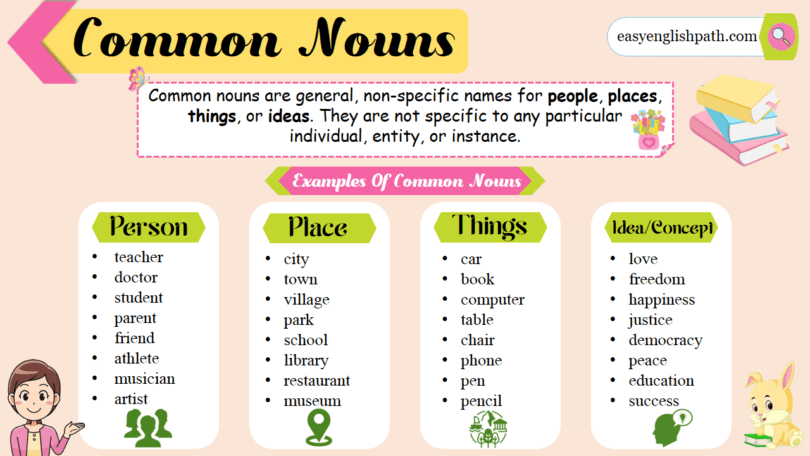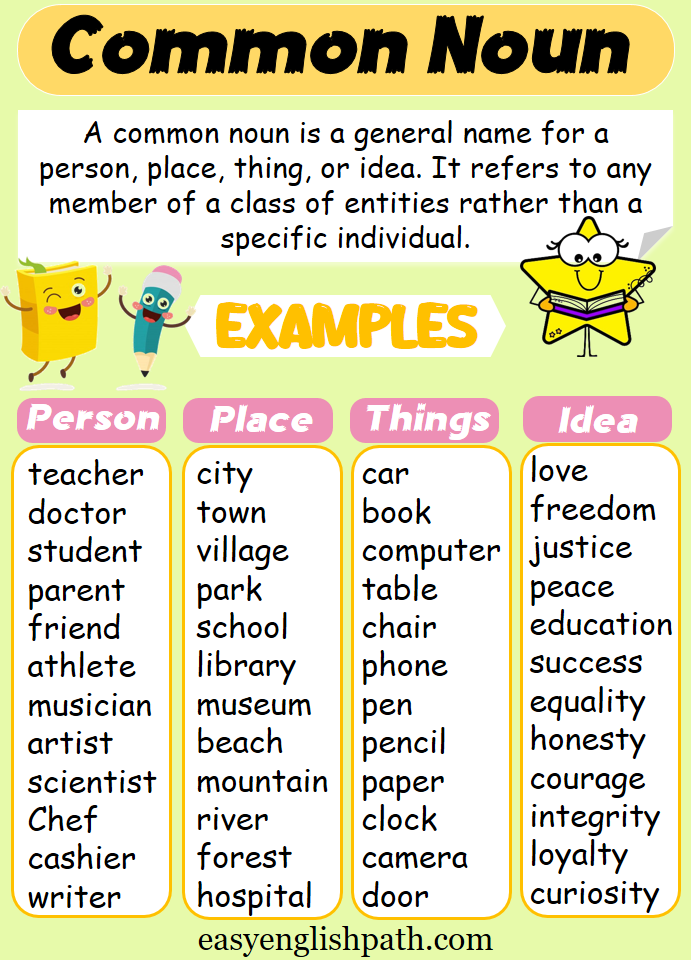What are Common Nouns?
Common nouns are words that name general items, people, places, or concepts rather than specific ones. They are not capitalized unless they start a sentence. Examples words: dog, city, book, and idea. These nouns contrast with proper nouns, which name specific, unique entities and are always capitalized, like Fido, New York, Harry Potter, and Democracy.
Examples:
- I saw a stray dog in the park.
- The red car sped down the highway.
- She bought a new book to read over the weekend.
- The children climbed a tall tree in the forest.
- My computer is running slowly today.
Common nouns vs. proper nouns
Common nouns are words that refer to general items, people, places, or concepts rather than specific ones. They are not capitalized unless they begin a sentence. Common nouns are used to name things in a broad sense. For example, dog, city, book, teacher, and river are all common nouns. They do not specify unique items but rather a category of things that share common characteristics. Common nouns are essential in everyday language as they allow us to talk about general ideas and objects.
Proper nouns, on the other hand, name specific, unique entities. These nouns are always capitalized to distinguish them from common nouns. Proper nouns refer to particular names of people, places, organizations, or titles. Examples of proper nouns include Fido, New York, Harry Potter, Mr. Smith, and Amazon River. Each of these names a distinct individual or place, making it clear what or who is being talked about. Proper nouns help to pinpoint exact identities and are crucial for specificity in communication.
Common Nouns:
- The dog barked loudly.
- They live in a bustling city.
- She read an interesting book.
- The teacher explained the lesson clearly.
- The river flowed gently.
Proper Nouns:
- Fido barked loudly.
- They live in New York.
- She read Harry Potter.
- Mr. Smith explained the lesson clearly.
- The Amazon River flowed gently.
Common Noun Roles in Sentences
| Role | Description | Example Sentence | Common Noun Highlighted |
|---|---|---|---|
| Subject | Performs the action of the verb | The cat sleeps on the couch. | cat |
| Direct Object | Receives the action of the verb | She kicked the ball. | ball |
| Indirect Object | Receives the direct object | He gave his friend a gift. | friend |
| Object of Preposition | Follows a preposition to form a prepositional phrase | The book is on the table. | table |
| Subject Complement | Provides more information about the subject | My brother is a teacher. | teacher |
| Object Complement | Provides more information about the object | They named the dog Max. | Max |
| Appositive | Renames or provides additional information about a noun | My friend, a talented musician, plays the guitar. | musician |
| Possessive | Shows ownership or relationship | The girl’s book is on the table. | girl’s (possessive form of common noun) |
Common Nouns Examples:
- The blue car zoomed past us.
- The happy child laughed loudly.
- Solving a math problem is challenging.
- The clear river flowed quietly.
- My computer crashed unexpectedly.
- A true friend supports you always.
- A squirrel climbed the tall tree.
- Tokyo is a bustling and vibrant city.
- I finished a captivating book yesterday.
- The playful dog chased its tail.
You May Also Like this






